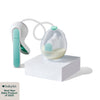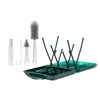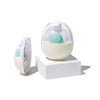Changes in your emotions, body, and sense of self can make the postpartum period difficult and hard to navigate. The important thing to remember is there are always resources available to you, from nonprofit medical organizations to home-based nurses and doulas. These resources can help you get answers, learn more, and connect with local resources.
When to seek emergent medical support
If you are experiencing any of the following, please immediately seek medical attention by calling 911 or the National Suicide Prevention Hotline at the three-digit dialing code 988:
-
Any unexplained pain, bleeding, or unusual symptoms
-
Thoughts or feelings of harming yourself or your baby
For non-emergency support from Postpartum Support International1:
-
Talk to a trained volunteer 24/7 at the PSI helpline by calling 833-943-5746.
-
Find an online support group to meet virtually with moms in your area
-
Get local support, and connect with a trained volunteer
-
Get help for your partner, including through dad support groups
-
Find a culturally specific provider in your area
Find local support
In addition to family and friends, a postpartum doula can assist you with your emotional and physical recovery. These professionals are trained to offer breastfeeding guidance, care for your baby while you nap or shower, make meals, or spend time with other children in the house.
Learn from experts
These books are some of our advisers’ favorite resources on the transition to motherhood, meditation, managing expectations, and even dad survival tips.
You can also check out the PSI library. All resources have been vetted and recommended by perinatal experts.
Lean on other moms
Connecting with other moms to share stories and advice can help you better understand yourself and your baby. These resources share the experiences of other mothers with the hope of letting you connect and feel solidarity that you are not alone. Who could better understand what you are going through than a mom?






















